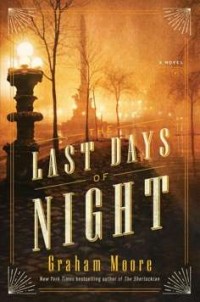
Published by Random House on August 16, 2016
The Last Days of Night is a fictionalized story of invention, but how much of the story is invented and how much is true to history I cannot say. The bare bones of the story are certainly true, and the inventors — Thomas Edison, George Westinghouse, and Nicolai Tesla — are real, as is Paul Cravath, who began a storied legal career by representing Westinghouse. How many of the novel’s details are fabricated is a question for historians. From a reader’s perspective, all that matters is the compelling nature of the story.
Young Cravath, fresh out of law school, has the formidable task of taking on Edison, whose Edison General Electric holds the light bulb patent and intends to be the sole electric company to wire the nation. Westinghouse hires Cravath to defend a lawsuit that Edison filed, claiming Westinghouse infringed his lightbulb patent. Westinghouse, on the other hand, initially relies on the dubious claim that he invented a better bulb.
Edison versus Westinghouse is the clash of two enormous egos, one of the century’s greatest inventors in competition with one of the century’s greatest engineers. According to the book, Cravath was instrumental in introducing Westinghouse to Tesla, one of the few scientists who was smarter than Edison. By inventing a practical way to make use of alternating current, Tesla solved the problem of transmitting electricity over long distances that had bedeviled both Edison and Westinghouse. Ah, but there was still the problem of building a better lightbulb, the only sure way that Westinghouse could avoid infringing Edison’s patent. Until Cravath had a better idea.
The book is a fictional look at one of history’s most engaging legal battles, but it spotlights real-world issues that continue to vex courts and politicians. What does it mean to “invent” something? When does the improvement of an old invention become a new invention? Should it be possible to patent an idea, or only the application of an idea? Isn’t there a risk that patents will stifle competition and innovation, at least if they are applied too broadly?
In the modern world, patent and copyright lawyers are kept fully employed as Google and Oracle and HP and hundreds of other high tech companies sue each other over allegedly misappropriated designs and lines of code. All of that results in money moving back and forth between corporations without doing much good for the public, which foots the bill for judges and court staff to deal with greedy businesses trying to take money from each other. And that’s what a large part of the novel is about.
The book also explores the relationship between big businesses and their allies: politicians and the press. By spreading out his considerable influence, Edison was able to buy editorials condemning Westinghouse’s new innovation (alternating current) while working to persuade legislatures to prohibit its use. Sniping between Edison and Westinghouse even led to the invention of the electric chair, providing a grim interlude in this fascinating story.
The novel is not kind to Edison, who seeks to destroy any invention he does not own, as well as the people who compete against him. Nor is it kind to J.P. Morgan, who places his own profit ahead of the common good. The most decent characters in the novel are two inventors — Tesla and Alexander Graham Bell — who both invent for the joy of inventing. Whether those characterizations are historically accurate I don’t know, but this is a work of fiction so I don’t really care.
In addition to corporate intrigue, the novel melds a crime story and a love story into the narrative. The love story involves Cravath’s second client, a woman of high society who has a surprising backstory. The novel defies categorization, but “literary historical legal thriller” probably describes it best. I’m tempted to call The Last Days of Night electrifying, but I don’t want to ascribe a poor pun to an excellent novel.
RECOMMENDED